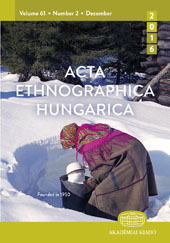The meanings and functions of mushrooms as food in Hungarian folk tradition
The meanings and functions of mushrooms as food in Hungarian folk tradition
Author(s): Győző ZsigmondSubject(s): Customs / Folklore, Cultural Anthropology / Ethnology, Sociology of Culture
Published by: Akadémiai Kiadó
Keywords: ethnomycology; edible mushrooms; Hungarian folk culture; Carpathian Basin;
Summary/Abstract: The article gives data referring to the meanings and functions of mushrooms in general, and with the Hungarians respectively to edible mushrooms. The Hungarians living in the Carpathian basin, being exposed to both mycophob and mycophile (German and Slavic) influences, formed an intermediary attitude, which is reflected up to now in the medium number of mushroom names and average knowledge about mushrooms. The knowledge about mushrooms of the Hungarian people can be considered medium, in some regions above average. The frequency of consuming mushrooms varies in different Hungarian regions. The article, while describing the mushroom consumption and mythology, the functions of mushroom in the food culture, the tools and methods of mushroom-gathering, the knowledge and beliefs related to edible and poisonous mushrooms, the role of edible mushrooms in folklore and folk art, compares them with other European traditions.
Journal: Acta Ethnographica Hungarica
- Issue Year: 55/2010
- Issue No: 1
- Page Range: 115-138
- Page Count: 24
- Language: English
- Content File-PDF

